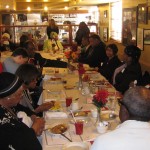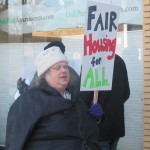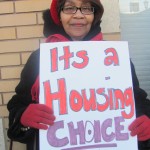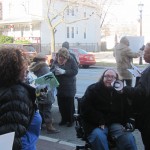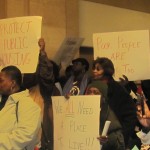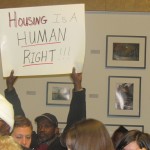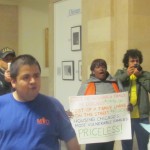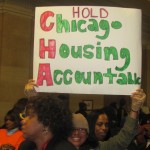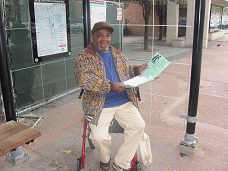Subsidizing failure
Mary Smith was living on a quiet Woodlawn block in 1978 when she got the news that she landed an apartment in one of the neighborhood’s first federally subsidized buildings. At the time, the golden-brick courtyard building at 6134 S. Kimbark Ave. was a bright spot in the neighborhood, which was struggling to regain its footing a decade after a spate of rioting that followed Martin Luther King Jr.’s assassination in 1968. Smith was just shy of 30 but already knew something about rebuilding herself. After moving from Tennessee, she was adjusting to life as a single mother and a widow in Chicago.
Smith has a round face spotted with freckles and speaks with a lisp. Her voice rises when she talks about her family’s early days on Kimbark. “We were 100 units strong,” she said of her neighbors, some of whom still live on the block. “We were taking care of the place. We were gardening. We were thriving.”
But more than three decades later, the building on the corner of 62nd Street and Kimbark Avenue has become more a symbol of failure than hope.
The heat is chronically cut off in the building. In most units, radiator covers hang half-cocked from the walls so tenants have pulled couches and beds in front of the hot pipes to avoid getting scorched. Some have taken in cats to catch the mice. One elderly woman keeps a cooler in her den to catch the rainwater that pours through gaps in the ceiling that the building’s maintenance crew tried to patch up with a piece of plywood and duct tape.
After barely passing federal inspection standards in recent years, the Kimbark building, along with a handful of other neighboring, federally subsidized buildings owned by the same company, earned a failing score of 43 out of 100 points last year. That was 17 points shy of just scraping by. One more failed inspection, and the government could step in to foreclose on the property. It is also plausible that the property could be sold off and the subsidies lost.
For tenants and housing activists, the problems at Kimbark go deeper than brick and mortar. The decaying building is a symbol of how public officials have looked the other way as landlords throughout Chicago received more than a billion in federal housing subsidies during the past decade while running some of their properties into the ground and, in some cases, using the buildings as their own personal ATMs.
A Chicago Reporter review of federal and local housing records found that 27 out of 194 properties containing more than 24,000 nonsenior federally subsidized housing units in Chicago failed at least one inspection between 2008 and 2010. Of 93 landlords overseeing these properties, 22 have been hauled into housing court by city attorneys who are suing them for at least $304,000 worth of violations since 2005. Two landlords, in particular, were taken to housing court on 22 separate occasions and amassed one-third, or $102,000, of the fines levied against property owners during that period.
Few people have worked with as many troubled Section 8 buildings as Shirley Johnson, the organizing director of the Chicago-based Metropolitan Tenants Organization. In her eyes, federal and local housing officials are doing too little to hit landlords where it hurts: the pocketbook. “They slap ’em on the hand, and they’re right back in the game,” Johnson said.
Johnson added that tenants should have a seat at the negotiating table. “Safe and decent housing—that’s all the tenants want,” she said. “They don’t care who is the owner or the manager. They just want them to be accountable.”
But officials said that, with affordable housing in increasingly short supply, a hard-nosed approach isn’t always the best way to fix troubled buildings. “We really do look at preservation as our main focus,” said Ed Hinsberger, director of the Chicago multifamily hub at the U.S. Department of Housing and Urban Development, who oversees subsidized multifamily buildings in Chicago.
Preserving the subsidies, Hinsberger said, means striking a delicate balance between holding building owners and managers accountable in the short term without leaning so hard that they decide to opt out of the program and sell the properties on the private market. “We try and figure out how to save a project, but it’s hard,” he said. “We don’t own it. We don’t control it. We can’t decide who it will go to. That’s beyond our authority.”
Still, critics said, the status quo that is tolerating too many substandard housing units must not be an option for HUD. That’s especially true, they said, considering that, with the widespread demolition of traditional public housing, the subsidized apartments represent the last bastion of stable housing for low-income families. More nonsenior apartments now exist in the 194 subsidized properties than those operated by the Chicago Housing Authority.
Jim Grow, an attorney with the National Housing Law Project, said poor performing owners and managers will have little incentive to improve until HUD takes a “more nuisanced approach” to dealing with troubled buildings. “You have to have a monitoring system that’s up for the task,” Grow said. “It’s a failure of the regulatory system to provide the money and not the quality.”
* * *
When Congress struck a deal in the early 1970s to begin pouring billions of dollars each year into subsidized housing, a group of young Chicago developers with an eye on rebuilding troubled neighborhoods began snapping up investments. Under the Section 8 agreements, they were guaranteed market-rate rents for up to 30 years. In exchange, they had to provide decent, safe housing for cash-strapped households.
The units are rented out on a first-come, first-served basis. To remain compliant, the landlords are required to submit annual financial reports and pass federal inspections, assessed on the safety and cleanliness of each property.
Experts point out that inspection scores are weighted, and common areas—like lobbies and grounds—can artificially boost scores or unfairly drag them down. Despite the limits, the inspections are one of the few benchmarks for measuring success. Until this fall, if landlords scored below 60 two years in a row, HUD had the power to push them into foreclosure. Under the new guideline, scoring between 30 and 59 puts the owners under increased scrutiny.
The Reporter analysis of federal data found that 30 of the 199 inspections recorded between 2008 and 2010 found failing conditions in Chicago, and 43 led to a score that was within five points of failing. This marked a nearly threefold increase in failing scores compared with the three prior years, when slightly more inspections were logged. While those scores should have raised red flags, HUD’s response has been lax. In 2009, for example, only two of the nine properties due for reinspection because of initial failing scores were scored that year.
HUD’s Hinsberger said he isn’t convinced that the failed inspections are the most accurate way of determining trends or even the overall health of Chicago’s portfolio. Some years, there are few inspections, he said, because budgets are tight. “Those inspections cost money,” he said. “Sometimes we don’t have the funds.”
Still, Grow said, officials could do more to bring troubled properties in line. HUD officials rarely put a financial squeeze on owners by gradually reducing subsidies to low-performing buildings, he said. And the agency should have a better policy for reviewing which owners are borrowing against their buildings. “Why should somebody be able to refinance and take out money without at least 70 [on their scores]?” Grow said.
Indeed, five out of 15 Chicago properties that have failed at least one federal inspection since 2008 were remortgaged within six years prior to failed inspection, a Reporter review of real estate records found.
“The system is set up so that the property is seen as a commodity, and the living conditions for residents are seen as secondary,” said Matt Ginsberg-Jaeckle, a community organizer with Southside Together Organizing for Power, a nonprofit that has been working with tenants for years to improve conditions in a series of Section 8 buildings on the city’s South Side.
With many of the contracts coming to an end, the properties have become much more susceptible to forces in the private real estate market. Roughly a decade ago, Kevin Jackson, executive director at the Chicago Rehab Network, began sounding the alarm that Chicago was facing an “invisible crisis” as the subsidies tied to roughly 21,000 units were scheduled to expire between 2000 and 2005. When the real estate market took a nose dive, Jackson said, landlords began rethinking the value of the guaranteed subsidies and have shown “a heightened interest” in extending their contracts.
As far as Johnson of the Metropolitan Tenants Organization is concerned, if landlords want the guarantees that come along with extensions—including up to nearly $290 million in rents for 2011 alone—federal officials should be pushing harder for building improvements. “HUD has a lot of leverage,” she said. “That’s where these landlords are getting their rent.”
City attorneys, meanwhile, have stepped up enforcement on troubled Section 8 buildings in recent years, citing the owners for violations by hauling some of them into housing court.
The bottom line, said former Chicago Department of Housing Commissioner Jack Markowski, who is now president of the Community Investment Corporation, which controls a fund that helps stabilize troubled buildings including Section 8 properties, is that “the city often has used code enforcement as a way to go after bad management.”
At least 31 properties have been sued by the city in housing court since 2005. A vast majority, or 75 percent, of the cases were filed between 2008 and 2011. Some of the cases involve fairly minor violations, such as doing construction without a permit and painting over electrical switches. Others are more serious. They include structurally unsound porches, missing smoke detectors and no heat or hot water in winter.
More than one-third of the housing court cases involve just two companies—East Lake Management and Development Corporation and the Woodlawn Redevelopment Corp. No. 2—which have racked up a combined $102,000 in fines. The number of fines attributed to East Lake, which is run by Elzie Higginbottom, is in part because the company oversees more Section 8 units—3,094 apartments in all—than any other entity. The company also manages a wide portfolio, which, like the Woodlawn Redevelopment Corp. No. 2’s parent company, includes Chicago Housing Authority properties.
Eileen Rhodes, vice president at East Lake, pointed out that the management company’s buildings have been given few failing scores on federal inspections—three in 78 inspections—in the past decade. “I think that the [federal inspections] are an indicator that the properties are in good shape,” she said.
Ironically, some of those troubled buildings surpassed expectations when it came to federal inspections. The Woodlawn Redevelopment Corp. No. 2, for example, was given a passing grade in 2009 at the same time it was being sued by the city for building code violations that included rodent infestation, mold and standing sewage.
* * *
The three-story building at 6134 S. Kimbark Ave. doesn’t look like much from the curb. Its golden-brick facade is dulled by the fine lines of age. A black wrought-iron fence rings a lawn that’s spotted with ashy patches of dirt.
The initial federal investment in the property—HUD had agreed to lock into 30 years of rent subsidies in 1974—was a sign that redevelopment was possible in the struggling Woodlawn community. For a young community organizer, Leon Finney Jr., the federal money was like a down payment on a local development initiative he called “The Dream Plan.”
Finney grew up in the neighborhood and was a rising star in the scrappy nonprofit, The Woodlawn Organization. With the community organizing skills imparted on him by the famed Saul Alinsky, his goal was to channel his neighbors’ desires—for decent housing and jobs—into action. That was The Dream Plan. And housing was key.
More than 30 years after the Section 8 program began, no section of the city was eligible for more rent subsidies last year than 60637, the ZIP code that includes Woodlawn and neighboring Washington Park. More than one in every $10 committed to Section 8 rents went to the 3,126 apartments in the area roughly bounded by State Street, Lake Shore Drive, and 51st and 73rd streets.
No Section 8 property has faced more recent scrutiny for how it has been managed than the Kimbark buildings, which are owned by the Woodlawn Redevelopment Corp. No. 2, an entity set up by Finney, and managed by the Woodlawn Community Development Corp., which oversees 902 Section 8 units throughout the city.
In late November, the city filed two fresh lawsuits against the nonprofit because the heat wasn’t working consistently for three weeks. Since 2008, the city has initiated eight additional legal cases concerning the cluster of buildings, which is anchored by the Kimbark building. All told, the city has sued the Woodlawn Redevelopment Corp. No. 2 for $57,755 in fines related to the Kimbark portfolio since 2008. The nonprofit faces another $140,685 in housing court fines for a string of unrelated, but troubled, rental buildings that are in foreclosure.
In December, city officials signaled that they were fed up with the ongoing disrepair at Kimbark. The Woodlawn Redevelopment Corp. No. 2 was added to a list of “building code scofflaws” who have failed to address scores of code violations in the past year. Finney has pledged to get his organization’s name removed from the list to avoid losing city contracts.
“In most other jurisdictions, HUD would have said, ‘You’re done,’” said Kate Walz, housing justice director at the Sargent Shriver National Center on Poverty Law. Walz has represented the Kimbark Tenants Association, which is co-chaired by Smith, in court in the past couple of years. “Chicago’s HUD office is looking at preservation. Otherwise, only tenants will suffer.”
A Reporter review of the management company’s financial records found that the building’s poor conditions have only been exacerbated by the nonprofit’s financial practices. In 2006, the property was refinanced, but few needed repairs were made with the money. Then, in 2009, more than $163,000 was transferred out of the property to cover unrelated expenses including payroll and bank overdrafts, the records show. The next year, federal inspectors found the buildings in such disrepair that they were given a failing score.
Finney rejected that the conditions at Kimbark are a reflection on his nonprofit’s property management skills. “Are you going to define me by that one property?” he said. “I have been there and done whatever needed to be done to make life well and function for not only them but for literally thousands of other people. So I just reject the idea of that.”
HUD has “some financial concerns” about how Kimbark and some other Section 8 properties are being managed by the Woodlawn Community Development Corp., according to Hinsberger. The agency has chided Finney in recent years for dipping into restricted housing subsidies to cover payroll and other expenses—some of which are tied to its sister agency, The Woodlawn Organization, independent audit reports show.
But it’s translated into little change for tenants who have learned to live with the substandard conditions.
For the second time in four years, Finney is attempting to sell the property, and he’s close to sealing the deal. If this deal goes through, the federal subsidy will be extended until 2029. Cullen Davis, whose company, Urban Property Investments, manages a series of other Section 8 properties, along with a partner, is expected to take the property over in January. The Illinois Housing Development Authority has approved $10 million in tax credits to begin rehabbing the Kimbark building. That’s money that the Woodlawn Redevelopment Corp. was not eligible for because of its poor property management track record.
The hope is that the new owners will do a better job at managing the federal subsidies, which should pump up to nearly $1.3 million in rents into the 100-unit development next year. Poor conditions have led to vacancies, though. About one-third of the 100 units sit empty.
The way Smith sees it, she’s faced with two bad choices: Stay at Kimbark and hope conditions improve under the new ownership or live with the chaos.
“I don’t want to leave this community,” said Smith, now 62 and retired. “I want to have a place where my kids can come back to and say, ‘I grew up here,’ so they feel like they have some roots.”
Emily Gowing and Sachiko Yoshitsugu helped research this article.
Original article
Photo: Mary Smith flips through her datebook, recalling a three-week period in the fall when the heat in her Woodlawn apartment building wasn’t working because of a broken boiler. Photo by Marc Monaghan.
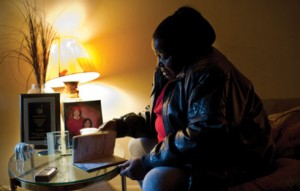
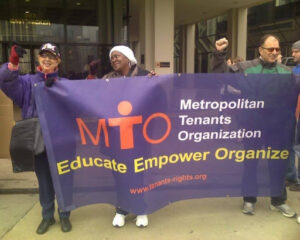 HUD tenants recently had concerns about bed bugs, issues with re-certification, retaliation by management, and the use of their community room in their building. Management at first did nothing to resolve the complaints. Tenants called MTO and building organizer David Wilson went to the building and informed them of their rights. Tenants in the Park Shore East building located at 6250 S. Harper then formed an association.
HUD tenants recently had concerns about bed bugs, issues with re-certification, retaliation by management, and the use of their community room in their building. Management at first did nothing to resolve the complaints. Tenants called MTO and building organizer David Wilson went to the building and informed them of their rights. Tenants in the Park Shore East building located at 6250 S. Harper then formed an association.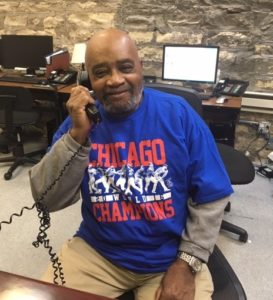 I was sad the day I learned that Mr. Green had passed. No one can remember the first day that Mr. Green began volunteering in the MTO office but it was a while ago, before we moved to our current location at 1727 S. Indiana. He first became involved with MTO because his HUD building was in terrible shape and he wanted to start a tenants association. He threw his whole self into organizing the tenants, who then voted him to be the association’s president. The tenants under his leadership gathered for monthly meetings, wrote and met with HUD officials, joined with other HUD tenants and even protested outside of HUD’s offices and in the end, the tenants won many of their demands. HUD paid for the rehab of his entire building.
I was sad the day I learned that Mr. Green had passed. No one can remember the first day that Mr. Green began volunteering in the MTO office but it was a while ago, before we moved to our current location at 1727 S. Indiana. He first became involved with MTO because his HUD building was in terrible shape and he wanted to start a tenants association. He threw his whole self into organizing the tenants, who then voted him to be the association’s president. The tenants under his leadership gathered for monthly meetings, wrote and met with HUD officials, joined with other HUD tenants and even protested outside of HUD’s offices and in the end, the tenants won many of their demands. HUD paid for the rehab of his entire building.
 Mr. Green and the other tenants testified every year at
Mr. Green and the other tenants testified every year at 





